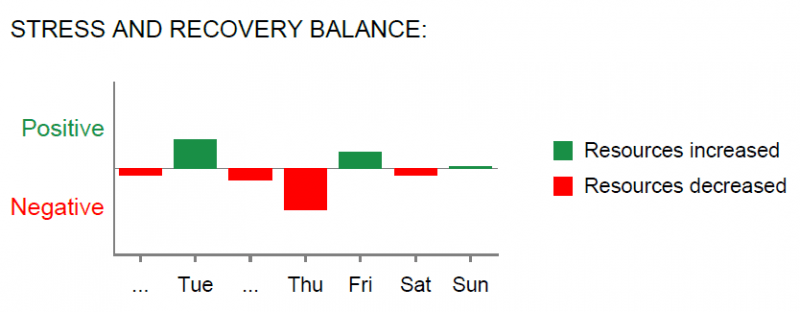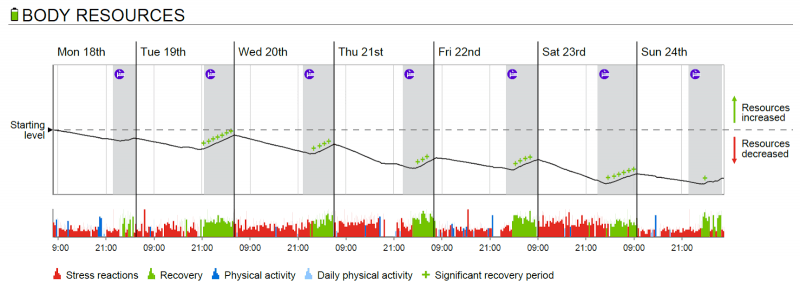
I get often asked by our customers, what it means when their resources are decreasing and whether it is dangerous or not. Resources decrease, if recovery is not sufficient in relation to stress.

The Lifestyle Assessment Resources graph illustrates whether your resources are increasing or decreasing during the measurement period.
This is also how athletes plan their training. A couple of days with more intensive training are followed by days with lower intensity training in order to enable recovery and to improve performance. As the competition season approaches and the intensity of the training increases, the cycles become shorter. In other words, when training with light intensity, the body can be stressed for longer periods but as the training load increases, also the importance of rest and recovery is emphasized in order to avoid overtraining.If the Resources graph shows that your resources have decreased during the measurement period, the first thing to do is evaluate whether this is a long-term trend or just a passing, stressful phase. Stress, occasional nights with poor recovery and temporarily decreasing resources do not have to be afraid of. When you want to develop yourself, temporary stress cannot and should not be avoided. Sometimes you’ll be reaching your limits but if stress is followed by sufficient recovery soon enough, you will develop, learn and push your limits even further.

Finding the balance between stress and recovery is essential. The faster you will replenish the decreased resources, the smaller the risk for overload. In addition, with enough resources you are able to develop yourself in different areas of life.
With multiple stress factors like long work days, short night sleep and hard training, it becomes more challenging to recover sufficiently and resources start to decrease. In this situation you should be able to hit the brakes and reconsider if some of the stressful factors could be cut off and how to enhance recovery. Unfortunately people often tend to do the opposite and cut down on sleep, eat less healthy and increase the use of alcohol and other stimulants, which makes the situation even worse.

Prolonged stress weakens the body’s ability to recover, which increases the need for sleep and relaxation. Many of us do the opposite in this situation and start to live more unhealthy which makes the resources run dry even faster.
It is also individual and affected by many factors, how many days or weeks one can survive with high stress levels. Others have physically more demanding bodies and are more sensitive for stress, but in general, for example health state and situation in life affect the resources, too.How “dangerous” decreasing resources are, is strongly individual. It is also crucial to tackle the situation as soon as possible. Prolonged stress is a severe health risk and may cause different diseases or exhaustion. When you are exhausted, you might even lack some content in your life, since you only have enough resources to cope through the work day.
I have had two guitars in my life. One of them stayed easily in tune whereas the other one needed tuning a lot more often. On the other hand, when it was in tune it played extremely beautifully. The same applies with human body. Others stay healthy easier, others get easily false due to for example stress and poor night sleep. It is essential to understand the “instrument” and know how to play it. A sensitive person has a more demanding nervous system, but you can also play nicely with a more challenging instrument. Professional hockey coach Erkka Westerlund stated in his key note in Firstbeat Stress Day that people don’t know themselves well enough neither mentally nor physically. I’ve come to the same conclusion. Actually, I think the more you learn about human physiology and mental resources, the more you come to realize how little we actually understand ourselves.
Lifestyle Assessment can teach us a lot. It illustrates how our bodies react to mental and physical stress and what kind of a cycle of stress and recovery fits us best in our current situation in life. Measuring has taught me to know my body better. Previously I used to overload myself constantly which lead to being angry at myself for having such a weak and fragile body. Now I can see that it’s like a sensitive instrument that needs a lot of attention but when treated right, plays the blues.
So, is it dangerous when resources are decreasing? It’s up to you. You are the conductor of your life, not other people or the circumstances. Are you ready to take the responsibility over your well-being and to make changes for the better? At the beginning it takes a lot of energy to change you daily habits and routines but it is possible and gets easier by time. At some point you will notice you are feeling better. When you are recovering well, it shows on every area of life. When feeling well, you are able to express yourself, have great performance and are innovative. After that it’s up to you which mountain you choose to climb.

A healthy lifestyle promotes stress management, enhances recovery and guides to exercise right. The small changes you make in your everyday life have a significant impact on your health and wellness.
This text is a translation of Firstbeat Exercise Physiologist & Wellness Specialist Satu Tuominen’s post “Elämän superkompensaatio – stressi voimavaraksi“
Do you want to find ways to increase your recovery with support of accurate data?
You might also be interested in

The Big Picture of Wellness – Stress Management, Good Sleep and Nutrition Go Hand in Hand
Weight management and healthy eating are issues that wellness professionals face every day with their clients.

Answering the Fitness Question with Science
When it comes to your health and fitness, it’s easy to ask the wrong questions. “Am I fit?” is one of these questions that just creates problems. Thinking about your fitness in terms of VO2max is the easiest way to get started.

Reflection on My Dry January: Did It Make a Difference?
In Finland, 20-30% of adults take part in alcohol-free January. I decided to test this myself, collect some data and see how an alcohol-free month affects me. Would I notice some benefits, such as increased energy, better sleep, or even improved heart rate variability (HRV) during sleep?


